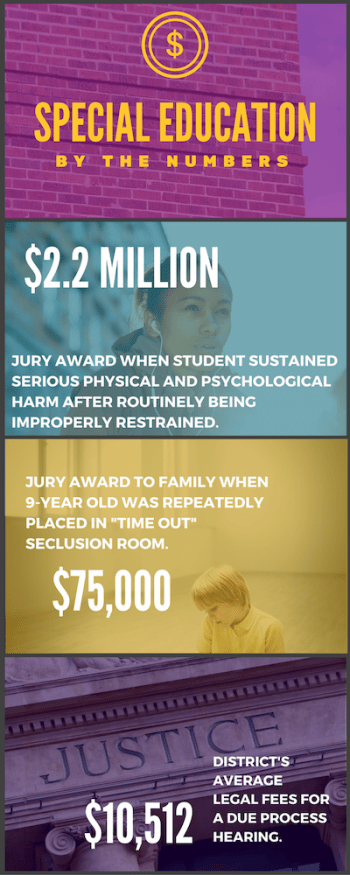Is it Worth the Risk?
Today, over 6 million students in U.S. public schools receive special education services. The demand on schools and school staff members to skillfully provide services to these students is increasing. So it’s important that all staff receive training on both the specifics of the laws associated with special education and the best practices and instructional strategies to meet the needs of their students with disabilities.
When staff are not properly trained, it can be very costly to the district and detrimental to both students and staff.
Negative impact on student outcomes.
When there is a failure at any point to correctly identify a student’s needs or to effectively address those needs, it can negatively affect the child’s chances of success.
The cost of due process hearings.
Parents have the right to file a complaint or seek a due process hearing if they disagree with the school’s or district’s decisions related to the evaluation, identification, programs, and placement for their child. According to Rethinking Special Education Due Process a report by the American Association of School Administrators, the average legal fees for a district involved in a due process hearing were $10,512.
In the same report, when asked to characterize the level of stress experienced by special education teachers, related services professionals, and special education administrators during a due process hearing or litigation, 95% of respondents classified the stress as high or very high. And 45% or superintendents reported that they are concerned about the loss of instructional time that occurs when teachers are required to testify or be involved in preparation for a due process hearing.
Physical injuries to students.
When school staff are ill prepared to support students with emotional and behavioral disabilities, restraint and seclusion are sometimes inappropriately used to manage student behavior. When restraint and seclusion are used improperly, there can be risks of serious physical injury to the student. These situations can also be costly to a school or district. In once case in Colorado, a jury returned a $2.2 million verdict to a family after the student sustained serious physical and psychological harm after being routinely improperly restrained. A key argument in the case was that there was a lack of staff training to address the challenging behaviors often exhibited in a special needs classroom and inadequate training on the proper use of restraint.
Physical injuries to staff.
The risk of injury to staff working in both special education and general education classrooms, or one-on-one with special education students, is also an unfortunate reality for many educators. According to Matthew Tardif, a loss control consultant with the Puget Sound Educational Service District Workers Compensation Trust, many of the injuries reported by school districts come from paraprofessionals and teachers working with students on IEPs. Most of the injuries occur while educators are attempting to manage students’ challenging behaviors. Tardiff calls for additional professional development in behavior de-escalation strategies and training in the proper use of restraint as keys to reducing staff injury and the associated worker’s compensation costs.
Managing the risks associated with special education is a complex issue, but professional development can help. Providing training on special education laws, the IEP process, instructional strategies and interventions for specific disabilities, behavior de-escalation techniques, and proper use of restraint and seclusion are crucial to ensure that your district is in compliance with the laws, students’ educational needs are being met, and staff and students remain safe from injury.
To learn more about the costs of not training all staff on special education topics, download the full whitepaper now.
Tags: Behavior Due Process IEP Injury Professional Development Special Ed Law





